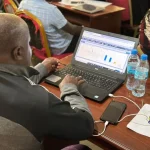The Secret to Achieving National Vaccination Program Goals. Data and Collaboration as Key Enablers for Tanzania

COVID-19 vaccines have proven to be the safest intervention in protecting the population against SAR-CoV2 infections, hospitalization, severe diseases, and death. However, as of 31st March 2022, only 10.6% of Tanzania’s eligible population (adults aged 18 years and above) was fully vaccinated. This proportion was far less than the WHO global targets on COVID-19 vaccination. To ensure increased uptake of the COVID-19 vaccines and achieve the global targets, Tanzania introduced extended data driven vaccination campaigns conducted in a stepwise approach, supported by in-house data experts from the Ministry of Health and Afya Intelligence, a community-based data firm that specializes in healthcare intelligence services. The goal was to fully vaccinate 30% of the eligible population by June 2022 in the first phase of the campaign. Phase two and three targeted to fully vaccinate 50% and 70% of the eligible population by September 2022 and December 2022, respectively.
Tanzania leveraged data science for a predictive analytics-focused monitoring, evaluation, and adaptive learning approach to address unique challenges in providing community-based COVID-19 vaccination services. The methodology involved collecting daily performance data for a minimum set of data elements (vaccination by gender, type, dose, and location) jointly agreed by stakeholders as of high importance to the community-based vaccination efforts. The Immunization and Vaccines Development (IVD) program, in partnership with Afya Intelligence, conducted rigorous data analysis mapping any inequities to generate foresights on how the program and regions must adapt and adjust to fit unique contexts. Data was disseminated through a facilitated process in weekly vaccine pillar meetings, where partners discussed the findings to inform the modifications of the vaccination strategies.
“ A stepwise and coordinated approach is necessary to achieve COVID-19 vaccination targets”
This unique data utilization approach informed motivation, supervision, and support for low-performing regions and contributed to adaptable community-based vaccination campaigns. By 31st July 2022, during the dissemination of week 12 findings, 50% of the regions had reached the goal of phase 1 (30% of the eligible population fully vaccinated). By 19th September 2022, 65% of the regions had already achieved phase 2 goals. The IVD program adopted a modified goal of 100% full vaccination of the eligible population by December 2022. The success of Tanzania’s vaccination campaign offers valuable lessons for other countries. First, a stepwise and coordinated approach is necessary to achieve COVID-19 vaccination targets. Other countries can adopt a similar approach to ensure maximum coverage and increased uptake of COVID-19 vaccines. Second, leveraging data science for a predictive and utilization-focused monitoring, evaluation, and adaptive learning approach is an effective strategy for addressing unique challenges in providing community-based COVID-19 vaccination services. Countries can collect daily performance data and jointly agree on a minimum set of data elements of high importance to their vaccination efforts. Data analysis can inform adaptations and adjustments to vaccination strategies for maximum effectiveness.
Third, regular data review meetings can help stakeholders discuss findings and inform modifications of vaccination strategies. This approach ensures accountability, transparency, and collaborative decision-making, leading to the achievement of vaccination goals.
Moreover, the approach can be applied to routine immunization services to improve vaccination coverage and address unique challenges. Collecting routine performance data and analyzing it can help identify and address gaps in routine immunization services. Holding regular meetings to discuss predictive analytics and inform adaptations to vaccination strategies can lead to the achievement of vaccination goals and improve immunization coverage. In conclusion, leveraging data and using predictive analytics is particularly relevant and effective to adapt COVID-19 vaccination and routine immunization efforts and helps to build responsive and resilient vaccination programs. Tanzania’s successful vaccination campaign offers valuable lessons for other countries to ensure maximum coverage and increased protection.
Afya Intelligence’s collaboration with the Ministry of Health( MOH) in predictive data analysis has been instrumental in the success of Tanzania’s COVID-19 vaccination campaign. By leveraging predictive and collaboration with local experts, Tanzania was able to achieve its vaccination targets for December 2022. If you’re interested in learning more about Afya Intelligence’s unique data-driven solutions and how they can be applied to your public health program, we encourage you to reach out. Let’s work together to build more responsive and resilient healthcare systems




